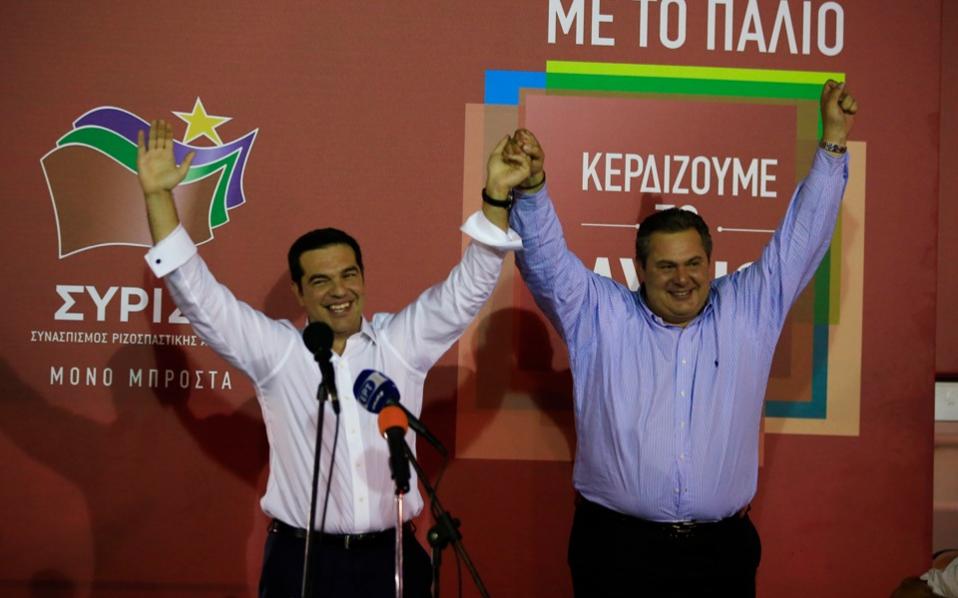Populist politicians are popular but not powerful

Populists on the left, populists on the right, there just aren’t many populists in power.
Partly that’s because establishment parties in the US and Europe have proven surprisingly resilient in the wake of the global financial crisis, deflecting challengers like the Occupy Wall Street movement and the UK Independence Party.
Partly it’s because political insurgencies have learned that governing isn’t their thing, that it’s better to carp than to sacrifice ideological purity and succumb to the compromises associated with actually running a country.
“The center has held pretty well,” said Cas Mudde, associate professor at the School of Public and International Affairs at the University of Georgia in Athens who studies extremist movements. “It’s the first real crisis of the European Union. In the US it’s completely unlikely that an anti-establishment party as such gets into power.”
The next disputant is Jeremy Corbyn, newly installed leader of Britain’s opposition Labour Party, who wants to return to the days of nationalizations, pump-priming and nuclear disarmament. Dire warnings of a Labour split – and predictions of continued success for the governing Conservatives – accompanied Corbyn’s ascension on Sept. 12.
Higher decibel levels at both ends of the political spectrum have left a silent majority in the center, yielding what some hail as stability and others revile as gridlock. The upshot: there’s little to shake the developed world’s consensus in favor of prudent budget and monetary policies, providing a predictable backdrop for markets.
Political laboratory
While the US has its claimants to the outsider mantle – just look at the Republican presidential field – the EU is a busier laboratory of political experimentation because, with 28 countries, elections there happen more often. Every few months, someone is going to the polls, and usually a coalition representing the broad middle results.
The mainstream’s latest triumph came over the weekend in debt-plagued Greece. Shorn of its communist-tinted faction, Alexis Tsipras’s SYRIZA party won a second term vowing to administer the harsh economic medicine that he denounced as recently as three months ago.
Tsipras Shifts
Tsipras clung to power by shifting toward the center. Other hard-left or hard-right movements have paid the price for doing so, like Austria’s nationalist Freedom Party. After making it into government in 2000, it split between pragmatists and true believers and was out of office two years later.
Now, with Middle Eastern refugees pouring in through southeastern Europe, the Freedom Party’s anti-immigration dogma is back in fashion. It tops the polls and even the center-left Social Democrats see it as a potential governing partner. Further east, Hungarian Prime Minister Viktor Orban play on anti-foreigner sentiment by building a border fence to keep out refugees.
In eastern Europe “in the wake of the refugee crisis, what was previously considered as fringe right-wing populism has, in fact, turned mainstream,” said Michal Simecka, research fellow at the Institute of International Relations in Prague.
The most common tactic of upstarts in Europe’s parliamentary systems is to build a big enough base to gain a few cabinet seats but influence policy from the sidelines. After winning 21 percent in a June vote, the Danish People’s Party went that route to pursue its foreigners-aren’t-welcome agenda.
“If they entered government they would have to bend their positions on a number of issues,” said Catharina Sørensen, head of research at Think Tank Europa in Copenhagen.
No extremist grouping has seized the reins in a large European country in recent decades. That would change in the improbable case of Marine Le Pen of the National Front becoming the leader of France, the only European state with a US-style presidential system. Her father showed the way by placing second in a national primary in 2002, only to be trounced in the runoff.
Le Pen’s Fate
Le Pen has toned down the National Front’s racism and sharpened its appeal to the economically downtrodden, putting her atop opinion polls with 27 percent in a Sept. 6 survey by Ifop. That level of support would vault her into the decisive round in 2017 – where the same fate as her father’s awaits.
“Her presence in the second round would galvanize a lot of people to come out and vote to block her,” said Jean-Philippe Dubrulle, a senior pollster at Ifop.
America has its outsiders too, or at least candidates dressed up like them. Freshman Democratic Senator Barack Obama fit that bill in 2008, as do real estate mogul Donald Trump and former Hewlett-Packard Co. Chief Executive Officer Carly Fiorina among the current Republican contenders.
But bona fide fringe movements such as the conservative Tea Party and the liberal Occupy – both products of the 2008 financial crackup – have never come close to taking power in Washington. The Tea Party’s main impact nationally has been to discourage the House and Senate leadership from compromise, further slowing lawmaking. At state level, the Tea Party’s tax-cutting obsessions have been tested in Kansas, resulting in gobs of red ink.
The Republicans’ internal tensions and ambivalence about government were on display in a Sept. 16 debate among candidates for the party’s presidential nomination. Senator Ted Cruz, a Tea Party favorite, called for the shutdown of the federal government over funding for Planned Parenthood, a women’s health organization that provides abortions.
John Kasich, the Ohio governor, said that’s the wrong way to go: “The American people are going to shake their heads and say: What’s the story with these Republicans?”
[Bloomberg]





